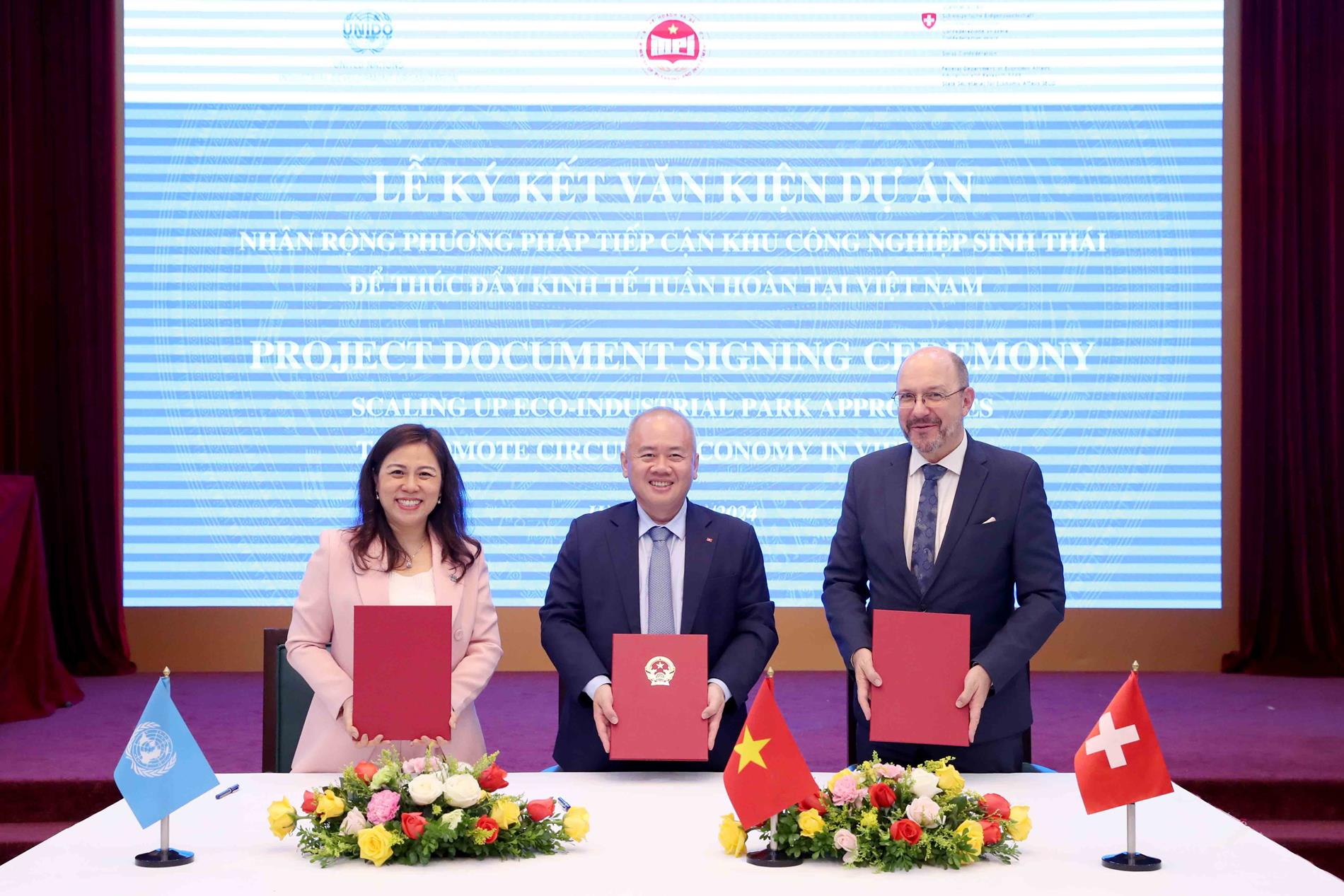(MPI) - The Ministry of Planning and Investment (MPI), in collaboration with the United Nations Industrial Development Organization (UNIDO), and the Embassy of Switzerland in Vietnam took place on November 15. The event drew the participation of MPI Deputy Minister Do Thanh Trung, Swiss Ambassador to Vietnam Thomas Gass and UNIDO Country Representative in Vietnam Le Thi Thanh Thao.
 |
| At the signing ceremony. Photo: MPI |
At the event, Deputy Minister Trung announced the receipt of 3.346 million USD grant from Switzerland, through the Swiss State Secretariat for Economic Affairs (SECO) to promote a circular economy and mitigate climate change impacts in industrial parks (IPs) across Vietnam.
This funding will facilitate the nationalwide scaling-up of the eco-industrial park (EIP) model by building on the successes of the 2014-2024 phase to promote circular economy practices in the industrial sector and within IPs, minimise the environmental impacts of industrial activities, and support IPs in adaptation to climate change.
The project aims to promote the implementation of a circular economy within enterprises in IPs, reduce the environmental impacts of industrial production, and help IPs adapt to climate change. The project will continue to scale up the implementation of EIPs, focusing on improving resource efficiency, minimizing waste, promoting recycling, and enhancing the economic, environmental, and social performance of businesses, thereby contributing to the sustainable and inclusive development of the industrial sector.
Deputy Minister Trung said that with the SECO’s support, Vietnam has changed four IPs to EIPs (in 2015-2019), and three are underway to transform for the 2020-2024 period.
Some outgoings can be mentioned includes integrating regulations on EIPs into legal documents related to IPs, environmental protection, and sustainable development; implementing solutions of EIPs at enterprises in IPs like reducing water, power, and material consumption, mitigating carbon emissions, and applying circular economy; building technical guidance on EIPs; improving awareness and training capacity on EIPs.
Swiss Ambassador Thomas Gass said by supporting the transformation of IPs into EIPs as part of our Economic Cooperation Development Program in Vietnam, Switzerland aims to address both the opportunities and challenges facing Vietnam's industrial growth.
“Switzerland’s vision is to bolster Vietnam's journey towards high-income status and its commitment to net-zero. Through this partnership, we hope to make a meaningful contribution to modernizing Vietnam’s industrial landscape, creating jobs, attracting investment and preserving the environment for future generation”, he added.
The industrial sector is a cornerstone of the economy. IPs not only attract foreign investment but also drive the growth of domestic businesses, enhance import-export activities, develop key industries, and contribute to the modernization of urban infrastructure.
Currently, Vietnam has 436 IPs, which attract approximately 35-40 percent of the total foreign direct investment each year. Over 300 of these parks are operational, providing jobs for more than 4.16 million direct employees and accounting for over 50 percent of the country's total export turnover.
With dedicated efforts to implement the National Green Growth Strategy for 2021-2030, vision 2050, the commitment to net-zero emissions by 2050, the Circular Economy Development Programme in Vietnam and other initiatives aimed at achieving sustainable development goals, the transition of IPs to EIPs and the establishment of new EIPs within the IP system will make a significant contribution to achieving green growth targets and advancing Vietnam's international commitments to sustainable development and climate change adaptation.
Le Thi Thanh Thao, UNIDO Country Representative shared, Vietnam is a leading country in Asia in terms of industrial competitiveness and continues to strengthen its position in the global value chains. Sustainable industrial development should go hand in hand with protecting environmental and social interests. EIPs minimise negative environmental impacts and optimise resource use, lower production costs, and enhance competitiveness.
She pledged UNIDO remains committed to supporting Vietnam in transitioning from traditional IP models to EIPs, building the foundation for a green, sustainable industrial sector that ensures long-term benefits for communities and future generations./.
| In Vietnam, the EIP model has been implemented since 2014, and is supported by international donors such as SECO and the Global Environment Facility. The project “Implementation of Eco-Industrial Parks Based on the Global Eco-Industrial Park Programme Approach” is a collaboration between UNIDO and the MPI, with funding from SECO. This initiative builds upon the achievements of the previous SECO and GEF co-funded project, “Implementing the Eco-Industrial Park Initiative Towards a Sustainable Industrial Park Model in Vietnam”, jointly executed by UNIDO and MPI from 2014 to 2019. These two projects have successfully introduced EIP models in IPs across Vietnam, including Khanh Phu, Gian Khau (Ninh Binh), Dinh Vu (Hai Phong), Hoa Khanh (Da Nang), Tra Noc (Can Tho), Amata (Dong Nai) and Hiep Phuoc (Ho Chi Minh City). |
Bao Linh
Ministry of Planning and Investment